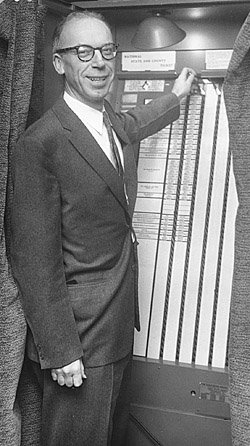The Lonely Battle
Ken Hechler’s 1958 Campaign
By Gordon Simmons
“Impossible.” After a moment or two, he adds, “For all kinds of reasons.”
That’s the response that former nine-term congressman and four-term secretary of state Ken Hechler offers when asked about his first foray into electoral politics.
By 1958, Hechler had been a resident of Huntington — and of West Virginia — for barely two years. Coming to Marshall College for a temporary teaching assignment, the Roslyn, New York, native nevertheless had an impressive resume. Besides having taught at Columbia and Princeton universities, Hechler had served as a special assistant to President Harry Truman and research director for the presidential campaign of Adlai Stevenson.
Acting on advice from his mentor, jurist Louis Brandeis, young Hechler decided not to be a small fish in a big pond and used his position as a placement specialist for political science professors to wrangle the Marshall appointment.
Hechler proved to be a popular and innovative instructor, and was soon well-known on campus and highly regarded by the student body. His classroom was equipped with a telephone and speaker, and he would call members of congress, supreme court justices, and other public officials as part of his instruction. He would often invite local elected officials to address his class, and brought in actual voting machines to let students decide the debates of the day. Administrators remained skeptical, however, wondering why an over-qualified New Yorker would want to set his sights on a temporary assignment at Marshall.
Meanwhile, Hechler was busy making contacts in the Huntington community beyond the college campus. He began cohosting a weekly political-affairs television show on Channel 13, titled “Comment.” Through book clubs, charity work, and membership in Trinity Episcopal Church, he also made the acquaintance of the social, political, and economic elite — as Hechler says, “the movers and shakers of Huntington.”
The November 1957 publication of his book, The Bridge at Remagen, by Ballantine Books, cinched Hechler’s growing renown and reputation. Based on his service as an army historian in World War II, his book was an instant success. Book royalties — and soon, money from the sale of movie and television rights — gave him an increased measure of financial independence.
The book also gave him increased political visibility in West Virginia. In January 1958, Democratic state party chair Hulett Smith took notice and recruited Hechler to conduct a precinct training course.
“I didn’t want to just stay in the classroom,” Hechler recalls. Urged on by his students, he had already made the fateful decision to run for congress from West Virginia’s fourth district after his assignment with Marshall ended.
You can read the rest of this article in this issue of Goldenseal, available in bookstores, libraries or direct from Goldenseal.

Dr. Ken Hechler, a political science professor at Marshall College, was
a dark-horse candidate for the U.S. Congress in 1958. His unexpected victory
sparked a long and distinguished career.